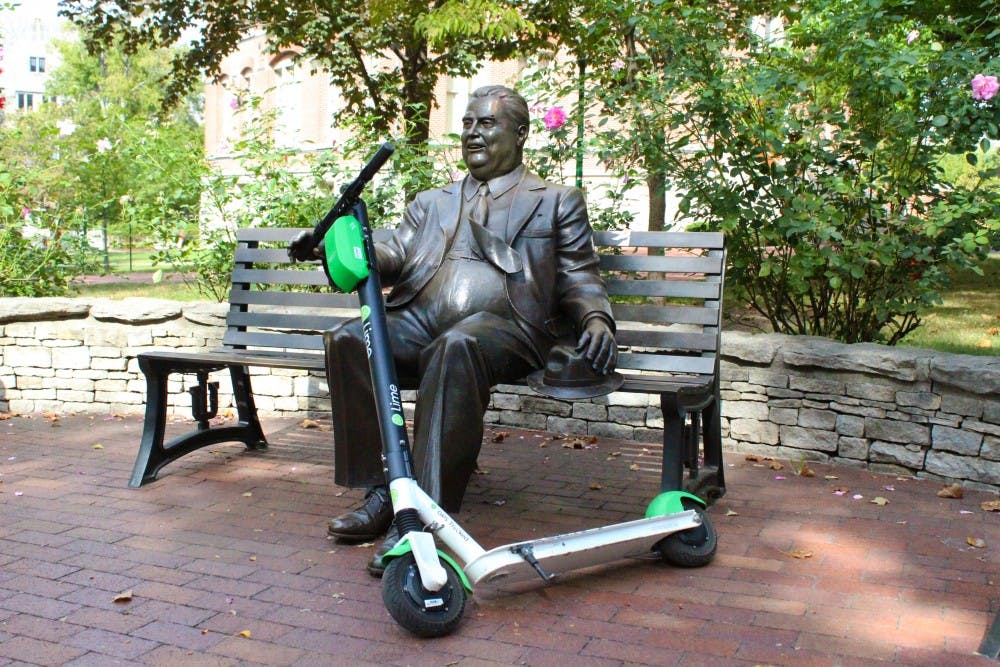IU Student Government executive branch members met over the weekend to analyze data collected from a survey regarding the role of electric scooters at IU and write a report for the IU Board of Trustees.
IUSG members distributed the survey link over social media and through text, and handed out physical surveys during two tabling sessions on campus. The responses were collected Sept. 19-21.
There were 529 recorded responses for the survey. Seventy-one respondents were faculty and staff and 458 were students.
In the report, which was finalized Monday, IUSG recommended the board not ban electric scooters and that they encourage IU campuses to adapt to the scooters.
The survey included five questions regarding scooters at IU.
One of the questions asked if the person completing the survey believed scooters have increased college affordability or economic opportunity for students. 67% of students and 25% of faculty and staff surveyed indicated scooters in some way make college more affordable.
The students’ response to this question was one of the main reasons IUSG recommended the Board of Trustees not ban electric scooters, IUSG congressional secretary Madeline Garcia said.
“I believe that for students that are often times in a hurry and are financially strapped, they don’t have the opportunity to always get on an Uber or take a bus,” Garcia said. “I think that scooters provide really easy transit for people in those emergency transit situations.”
While the input of the faculty and staff were taken into consideration when recommending new policies, more students responded to the survey and students are those primarily using the scooters, Student Body President Isabel Mishkin said.
“We are much more comfortable coming to some generalizations about what the students of Bloomington think than about the faculty and staff, since there were only nine faculty members and 62 staff members,” Mishkin said.
Another question asked those surveyed to write a short response addressing any other scooter-related issue the person felt IUSG needed to know.
Around one half of students who completed the survey wrote a short-answer response, Mishkin said.
Of those responses, IUSG members created the report which collected the words most frequently used by students and faculty and staff.
Faculty and staff used more words like “injury,” “dangerous,” “helmet,” and “ban.” Students used more words such as “people,” “ride” and “campus.” One popular word the two lists shared was “sidewalk.”
Based on this response, and their personal experience with scooters on campus, IUSG members wrote in their plan that IU campuses should try to increase the amount of bike lanes.
This includes figuring out areas more prone to Bird or Lime accidents and building more lanes for the scooters. For IU-Bloomington specifically, this also includes working with the City of Bloomington to widen current bike lanes, which would allow space for bikers and scooter riders.
“I think if we could really work on establishing safer bike lanes and more bike lanes, then we won’t have as much of a safety concern when it comes to scooters,” IUSG Chief of Staff Drew Ficociello said.
One recommendation in the report is prohibiting scooter operation around areas such as the athletic complex on game days and Fee Lane, which is a steep hill. Another is creating an education campaign that informs students how to properly use the scooters at intersections, navigate areas with heavy foot traffic and seek medical care if injured.
Ever since the first Birds were dropped off Sept. 13, 2018, people have been attempting to use them properly and figure out their role on campus, Garcia said. With the help of education and better infrastructure, IU can help students to operate the scooters more safely and create a better environment for staff, faculty and students as they navigate campus.
“I think it’s important that we keep the resource around for students that need it,” Garcia said. “They’re available for everyone. Use them if you want. Ignore them if you don’t.”




